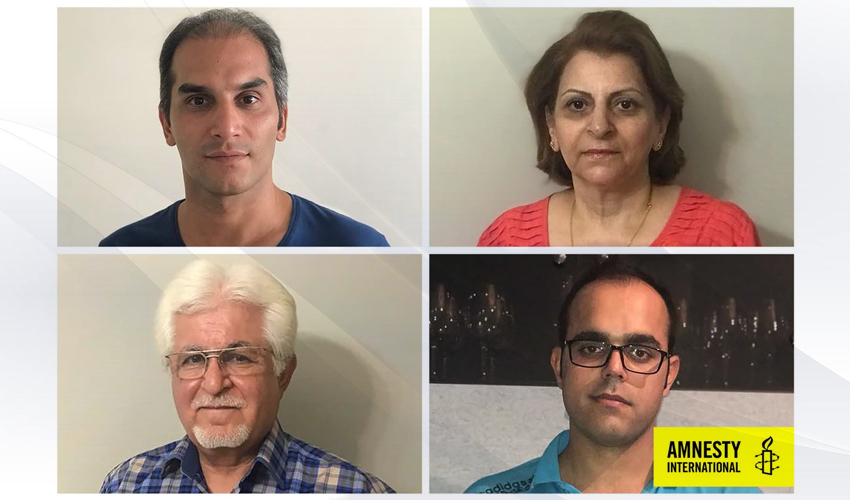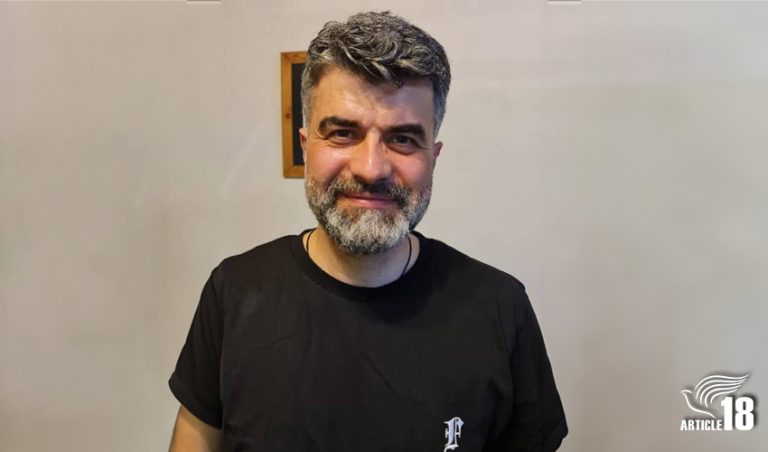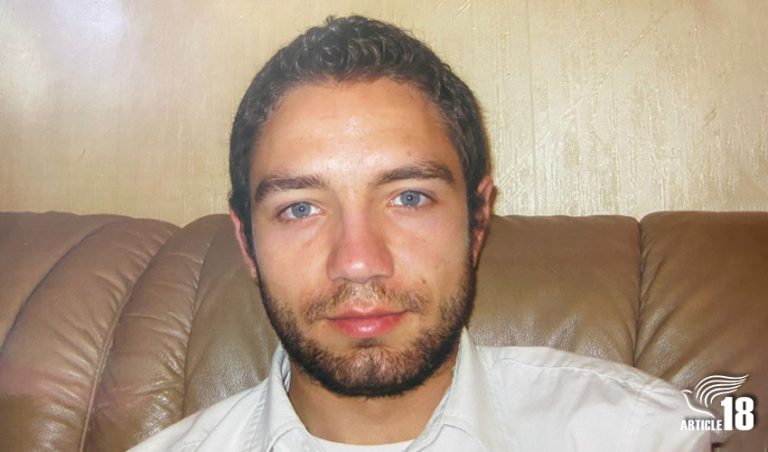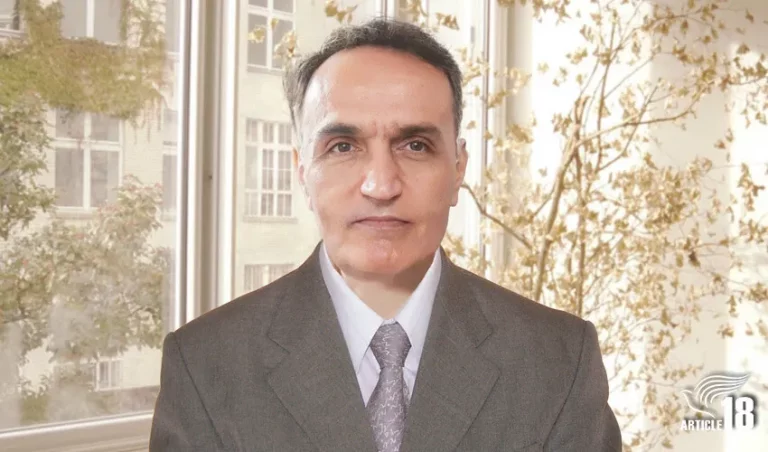This case study was used as part of a UK government-funded report into the persecution of Christians worldwide. The case involves four Christians handed long jail sentences: Victor Bet-Tamraz, his wife Shamiram Issavi, and Christian converts Amin Afshar-Naderi and Hadi Asgari.

Case referenced by
Article18, Amnesty International, OHCHR, Center for Human Rights in Iran, UK Parliament, Forbes, Middle East Concern.
Short Summary
On 26 December 2014 plain-clothed security officers raided Pastor Victor Bet-Tamraz’s house during a Christmas celebration. They temporarily arrested all the attendees. Pastor Victor and Christian convert Amin Afshar-Naderi were detained. Later on Pastor Victor’s wife, Shamiram Issavi, and another convert, Hadi Asgari, were arrested. Pastor Victor was sentenced to 10 years’ imprisonment, Amin to 15 years, Hadi to 10 years, and Shamiram to 5 years.
Background events
Pastor Victor is an Assyrian pastor. His church was officially recognised by the Iranian government until 2009. He led a Pentecostal Assyrian Church in Shahr-Ara, Tehran, before it was shut down by Iran’s Ministry of the Interior in March 2009.
Pastor Victor was a target of continuous harassment by the Ministry of Intelligence (MOIS) for many years. He held Persian-speaking services for years at his church. In March 2009 the Assyrian Member of the Iranian Parliament, Yonathan Betkolia, announced the closure of the church, by order of the Islamic Revolutionary Court, as it offered a Persian-language service attended by converts from Islam.
Pastor Victor refused to stop his Persian-language services while the church was temporarily closed. For that reason and following pressure from the authorities, the church removed him from leadership and stopped Persian-language services, and then the authorities re-opened the church but without Pastor Victor.
On 26 December 2014 plain-clothed security officers raided Pastor Victor’s house during a Christmas celebration. They temporarily arrested all the attendees. They separated men from women and searched them, seizing all Bibles, mobile phones, and identity documents. Pastor Victor and Amin were detained. Pastor Victor was verbally charged with “conducting evangelism” and “illegal house-church activities”, among other charges that amount to the charge of “acting against national security”. He was released on bail (approx. $110,000) on 1 March 2015.
Following Pastor Victor’s arrest, his wife Shamiram was ordered to meet with officers of the Intelligence and National Security Organisation. She was questioned and interrogated for several hours. She was told to fill out various forms and write down information concerning their church- and house-group activities and they also requested a list of all members of their house-church, with their details.
On 26 August 2016, MOIS security officials raided Amin’s home in Firoozkooh, in the Alborz Mountains north-east of Tehran, where friends had gathered for a picnic. Amin asked to see the arrest warrant, which the officials did not produce, and instead showed him their gun, saying: “this is our warrant”. Amin was then beaten and arrested. There were no apparent reasons for the raid apart from their Christian faith. The MOIS officials then asked all the individuals to fill in a form with their personal details, including their religious and church affiliation, their involvement in house-churches and social-media passwords. All were then taken to the Firoozkooh prosecutor’s office, where their charges of “house-church activities” were read out to them.
The women were released but the MOIS officials took five men to Evin Prison for interrogation. The men included Amin, Hadi, Ramiel Bet-Tamraz (the son of Pastor Victor), and Mohammad Dehnavi. All were members of Tehran Pentecostal Assyrian Church before it was shut down by Iran’s Ministry of the Interior in March 2009. Hadi, Mohammad and Amin are converts to Christianity, but Ramiel is an Assyrian Christian.
The families were initially unable to obtain information about the whereabouts of those detained. The following day they were allowed to make brief calls to inform their families that they were held in Tehran’s Evin Prison. During the entire period, they were not given access to lawyers. Hadi and Amin were charged with “acting against national security” and “organising and establishing house-churches”. Shortly after the arrests, two of the wives of these men were removed from their jobs on the orders of Iranian security forces.
On 10 October 2016, Ramiel and Mohammad were released after submitting bail equivalent to $33,000 each. At that time they had not been informed of any charges against them.
They were later charged with “acting against national security” and “organising and establishing house-churches”, and Ramiel faced additional charges related to the ministry of his father.
In February 2017, Hadi and Amin started a hunger strike in prison in protest at the lack of due process and to demand adequate medical care and an end to the delays in their case. Hadi was suffering from a kidney infection and did not receive any medical attention. On 12 February, Amin became very ill as his blood pressure dropped.
On 14 February, 11 days after their hunger strike, Mr Ali Akbar Bakhtiari, head of the Attorney General’s office, and his deputy visited Evin Prison. During their visit, they promised to investigate the situation of political prisoners and others imprisoned on account of their religious beliefs. Hadi and Amin were also summoned to defend their cases and as a result it was agreed that the amount of bail requested for their release would be reduced from 200 million to 170 million tomans (about $52,000) each. A promise was given that their cases would be attended to.
Pastor Victor and Amin were summoned to a court hearing on 21 May 2017. The hearing took place at the 26th Revolutionary Court in Tehran. The hearing related to the charges laid against them following their arrest in December 2014. Pastor Victor and Amin attended the hearing, as did Hadi, Pastor Victor’s wife Shamiram, and their son Ramiel. The hearing could not be concluded in Amin’s case because the judge had not provided all necessary documents to the defendant’s lawyer. It was agreed that the lawyer would meet the judge at a later date after she had examined the documents, as the cases of Pastor Victor and Amin were linked. No verdict was issued.
A further hearing then took place on 11 June 2017. On 3 July, the Judge, Mr Ahmadzadeh, gave his verdict. Pastor Victor was sentenced to 10 years’ imprisonment, Amin to 15 years (including time already served) and Hadi to 10 years, all with a 2-year travel ban. The judge also raised the amount of bail for Amin to 270 million tomans (approximately $80,000) and 170 million tomans for Hadi (approximately $50,000). The legal representative of these men filed an appeal to overturn the sentences.
Amin was finally released on bail equivalent to $80,000 on 25 July 2017. He was still on hunger strike until the day of his temporary release. His physical health had greatly deteriorated. Forty-eight hours after his release he was taken to hospital. The long-term effects of his time in prison remain a concern.
(Hadi was initially unable to raise the bail demanded for his conditional release. The appeal court then refused to allow conditional release, but finally he was allowed conditional release on 11 April 2018 on submission of bail of 120 million tomans.)
Pastor Victor, Hadi and Amin were summoned to a first appeal hearing on 25 April 2018. The two judges allowed the defendants and their lawyer to present their defence, but they informed them that there would probably be two further hearings.
Shamiram charged and sentenced
Shamiram was summoned to Evin Detention Centre, Branch 3 of the Revolutionary Court, in Tehran on 19 June 2017. She was formally charged with “participating in foreign seminars”, as well as “acting against Iranian national security by being a member of the church leadership.” She was released after one day on bail of 100 million tomans (approximately $30,000). Shamiram had not been formally arrested or charged by the authorities in the past.
Shamiram was called to attend a hearing on 31 July 2017 in Tehran at the 26th Branch of the Islamic Revolutionary Court, under Judge Ahmadzadeh. Shamiram’s lawyer requested that the hearing be postponed as he had no access to the case files and needed to go through all case-related documents prior to the hearing. The hearing was then postponed to 21 August 2017. On 21 August, Shamiram and her lawyer appeared in court and requested another postponement in order to gather more information and to better prepare for the hearing.
The hearing took place on 12 December 2017 and the verdict was delivered on 6 January 2018. Shamiram was sentenced to five years’ imprisonment on charges of “action against national security”, “attending a foreign seminar” and “training church leaders to act against the regime”. There was a preliminary appeal hearing on 9 May 2018, but the judge spoke disrespectfully, making unsubstantiated claims against the family and would not allow Shamiram to speak in her defence.
On 11 Jul 2018, Pastor Victor and Shamiram’s son Ramiel was sentenced to four months in prison, alongside Mohamad Dehnavi and Amir-Saman Dashti, for “acting against national security by attending house-churches” This followed a hearing on 18 June at the 26th branch of the revolutionary court in Tehran, under Judge Ahmadzadeh.
Analysis
Similar to case study 1, the prisoners of this case have been persecuted by the Iranian authorities for years, mainly for practising their faith. Though Christians are one of the few religious minority groups that are officially recognised in Iran’s constitution and provided limited protection and freedom to worship, the recognised churches are not allowed to worship or hold any services in Persian. (In theory, the Iranian constitution in five articles talks about the rights and the safety of minority groups: Article 13 specifies the freedom of the three recognised religious groups, Christians, Jews and Zoroastrians. Article 14 talks about the human rights of non-Muslims. Article 64 gives religious-minority groups the right to elect their own representatives in the parliament. Article 26 permits them to form political, social and professional parties. Article 19 speaks of the equality of all people, groups and ethnicities before the law.) They are not allowed to share their faith with Muslims or permit converts to participate in their church activities. If they do, the church may face severe persecution, such as the closing down of the church and imprisoning of church leaders. The case of Pastor Victor is a good example of such a situation. In this case, the law does not protect them. Therefore, as described above, Pastor Victor and his leadership team have been a target of harassment, arbitrary arrest, detention, imprisonment and unfair trials. Though their cases are faith-based, they have been given political charges.
Moreover, those detained or charged often have to obtain and hand over exorbitant amounts for bail, which are often forfeited as some choose to flee the country in the knowledge that they are very unlikely to receive a fair trial and just verdict. Those awaiting trial who flee the country are tried in absentia. Many will face a gruelling legal process, and until their case is heard, which could take several years, their lives are in limbo.
Therefore, the majority of the Christians arrested in the last few years and later released, either after finishing their prison sentences or temporarily released on bail, received severe warnings and threats against any further Christian activity. Once released, they are closely monitored, and risk re-arrest and imprisonment if they engage in or are suspected of engaging in any Christian activity.
The International Covenant of Civil and Political Rights (ICCPR), to which Iran is a signatory, states: “Everyone shall have the right to freedom of thought, conscience and religion. This right shall include freedom to have or to adopt a religion or belief of his choice and freedom either individually or in community with others and in public or private, to manifest his religion or belief in worship, observance, practice and teaching.” Based on Article 18, religious-minority groups including those who have changed their religious affiliation should not be denied the right, in community with others or in private, to practise their religious beliefs or use their own language to worship. Therefore, Iran should be held accountable to uphold its obligations under its own constitution as well as international law (Article 18) to improve religious freedom and belief in the country for all peoples of Iran.
The UK should call for the acquittal of Pastor Victor, Shamiram, Hadi and Amin. Iran should be pressured to change unjust and oppressive policies against religious minorities.
UK involvement
A question was raised by Mr Gregory Campbell MP, on 11 July 2017, to the Foreign and Commonwealth Office suggesting the FCO issue a statement to the Iranian government regarding the treatment of Pastor Victor, Amin and Hadi.
The FCO responded on the 17 July 2017, saying:
The Government is aware of reports regarding Pastor Victor, Amin and Hadi. The Government notes the worrying trend of harassment of Christians in Iran and strongly condemns any mistreatment of religious minorities in the country. We regularly raise our concerns about the human rights situation in Iran both in London and Tehran. We call on Iran to cease harassment of religious minorities and to fulfil its international and domestic obligations to allow freedom of religion to all Iranians.
Latest updates
In January 2020 Ramiel was summoned to Tehran’s Evin Prison to serve his four-month sentence. He submitted himself on 7 January. He was released on 26 February following the outbreak of the coronavirus and told he would not need to return to complete his sentence.
Several appeal hearings for Pastor Victor, Shamiram, Hadi, Amin and fellow Christian convert Kavian Fallah-Mohammadi were scheduled in 2019 only to be postponed, with a variety of excuses given. In one instance, on 13 November, the court was said to be “too crowded”. The pattern continued in 2020 with another postponement in February due to a procedural issue, then another in June, that time without excuse.
Finally, on 19 July 2020, Pastor Victor received a telephone call from his lawyer, informing him that his appeal had been rejected and no further hearing would take place.
It wasn’t immediately clear whether the same was true in Shamiram’s case, though the couple feared it would be, given that their cases had been officially merged by the new judge, Ahmad Zargar, in February 2019.
Finally, on 11 August, their worst fears were confirmed as Shamiram was summoned to Evin to begin her sentence. She was given five days to turn herself in.
The night before Shamiram was due to begin her sentence, the couple fled Iran to seek asylum abroad. In September 2020, Pastor Victor spoke with Article18 about all that had happened.
The three converts, Amin, Kavian and Hadi, have also fled Iran to escape their own lengthy prison terms.



0 Comments
Trackbacks/Pingbacks